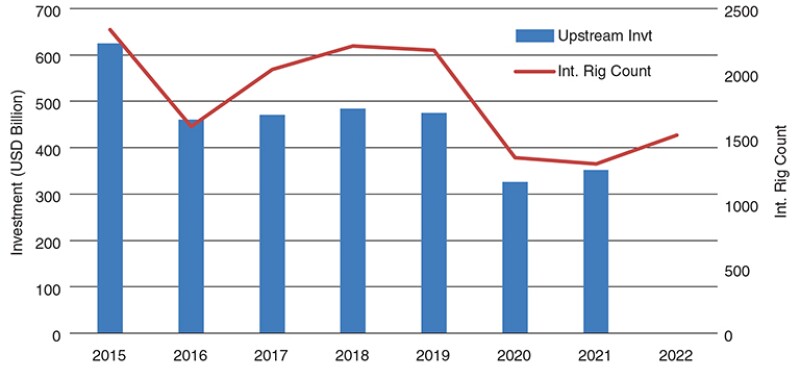The 2021 SPE Annual Technical Conference and Exhibition (ATCE) was held in September as a hybrid (in-person and virtual) event in Dubai with more than 6,000 participants, with the health and safety of the participants being our highest priority. While the number of attendees is lower than in previous years, there was a general feeling that we may finally be getting out of the pandemic situation, after 18 months of a complete transformation of the way we work, communicate, and move.
Thanks to the Conference Chair Ali Al Jarwan, CEO of Dragon Oil; Program Committee Chair Fareed Abdulla AlHashmi, COO of Dragon Oil; and the ATCE Executive and Program committees for organizing an excellent event under the theme of “The New Oil and Gas Journey: Agility, Innovation, and Value Creation.” The conference included 80 technical sessions, six plenary and panel sessions, and eight special sessions, spanning digitalization, electrification, sustainability, and emerging themes. Our appreciation goes to the sponsors, the exhibitors, the presenters, the volunteers, and the SPE staff.
Dubai and the UAE, 1 week before the 2020 World Expo, were great hosts. Congratulations to the winners of the SPE (and AIME) International, Regional, and Student awards (https://jpt.spe.org/spe-honors-2021-international-award-recipients-during-annual-meeting). Many of them were able to travel to Dubai to receive their recognition. The Startup Village Awards, organized in collaboration with Rice University, was also well attended, and the winners were recognized (https://jpt.spe.org/2021-atce-startup-village-competition-winners-announced). The dynamism of the city of Dubai and the country of UAE and their capacity to project themselves in the future with a unique 50-year strategical timeframe that spans the period 2021–2071 never cease to amaze me.
The world, including developing economies, has expanded significantly the COVID-19 vaccination campaign, reaching more than 6 billion doses administered, and nearly half of the world has received at least one dose of vaccination as of early October. The “green list” of countries deemed safe for travel is expanding after a summer that has seen a major impact of the COVID-19 Delta variant.
Oil and gas demand is recovering for sectors such as transport and industry, even though the airlines may not see pre-pandemic levels of activity before 2025. Massive amounts of public funding injected to fuel the world’s economic recovery have been announced in Europe, the US, and Asia, adding up to trillions of dollars. However, economic recovery from the pandemic will take time, as there is a major backlog in global manufacturing activities impacting consumer markets and creating inflationary pressures.
Among major events associated with the recovery, the recent increase in natural gas prices in international markets is unprecedented—the Asian LNG prices tracked using the S&P Global Platts JKM (Japan Korea Marker) LNG Price Assessment were at a historical low of USD 1.80/million Btu months ago. It has now jumped to USD 56/million Btu for a November cargo delivery. In Europe, Dutch wholesale gas prices for December jumped to EUR 160/MWh for December, while in the US, Henry Hub gas prices jumped from USD 1.70 to 6.30/million Btu in the past 18 months! Among the factors that led to such a large price increase were expectations of a cooler winter, lower wind-energy contributions, and the impact of maintenance on some of the LNG export facilities. The surge in natural gas prices is one of the reasons that oil prices have seen a recent hike above the USD 80/bbl level.
Energy prices could significantly impact inflation rates during the recovery, with other commodities such as steel and cement having risen sharply recently.
An area of recovery that is very important to the SPE membership is the oil and gas activity. Investment in the upstream industry, which is the main driver for employment in the industry, has seen two major drops in the past 6 years. The first occurred after 2015 with a 26% reduction in upstream spending, followed by a marginal increase in the subsequent 3 years. The second decline in upstream spending was even higher at 31% in 2020.

Upstream investment in 2021 is at its lowest level in more than a decade, at 56% of its 2015 level. While oil and gas companies have not yet finalized their investments for 2022, a proxy for the activity change is in the Spears projected international rig count. From a 2015 high of 2,337, the rig count has decreased by 42% up to 2020. Next year (2022) should see a relatively modest recovery but remain 35% below the 2015 level.
Another worrying indicator is the level of exploration investment by oil and gas companies that has declined from 14% of their capex expenditures at the beginning of the previous decade to half of that value in 2021. New reserves are not being added at their historical levels, leading to decreased reserves-to-production ratios for major oil and gas companies.
The need to increase the level of investment in the upstream industry in all energy scenarios is very clear. Even in the International Energy Agency’s Net-Zero Emissions scenario, which is consistent with a 1.5°C trajectory, investment in oil and gas needs to be at least 30% above the current level for the period between 2021–2030, and every year of lower spending requires catching up if the world wants to avoid the price spikes recently observed. Not spending in new oil and gas developments can have major consequences on the world’s energy security, as demonstrated by the recent fragility of the supply and the price overheating.
To contact the SPE President, email president@spe.org.


